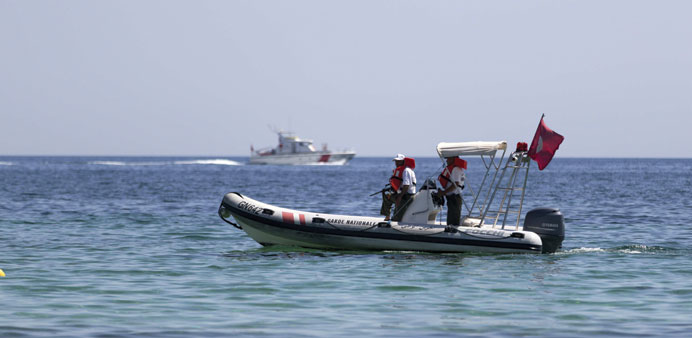Tunisian security forces patrol the beach in front of the Riu Imperial Marhaba Hotel in Port el Kantaoui on the outskirts of Sousse, south of the capital Tunis yesterday. Analysts say the economy should avoid a repeat of the recession which followed the 2011 revolution.
Reuters/Dubai
An assault on a Tunisian resort, which killed 39 people, has sent holidaymakers fleeing and dealt a major blow to the country’s tourism industry, but the broader economy should be robust enough to withstand the shock.
European tour operators are evacuating thousands of tourists after Friday’s attack by a lone militant on a beach in Sousse and many foreigners are likely to shun Tunisia in the months ahead until they feel it is safe to return.
This, in turn, will hit Tunisia’s foreign exchange reserves and could lead to a weakening of its currency.
However, analysts say the economy should avoid a repeat of the recession which followed the 2011 revolution. Inflation appears steady below 6%, tax collection is improving and authorities have started to rein in spending, which may offset the blow from any tourism slump.
Just as importantly, elections in late 2014 led to a ruling coalition with a large parliamentary majority. This may let the government push through long-delayed reforms to attract more investors.
“Although over the short term there will be negative shocks to tourism income, the economy has made some important positive steps,” said John Sfakianakis, Riyadh-based director for global fund manager Ashmore Group. “The parliamentary majority should enable approval of structural reforms delayed by the 2011-14 political transition, including financial sector reforms and laws on competition, bankruptcy and public-private partnerships.”
Financial markets reopened yesterday after the attack and indicated investors weren’t panicking. The stock market dropped 1.0% and the dinar fell only modestly against the dollar.
Arnaud Louis, director at Fitch Ratings, which in March raised its outlook for Tunisia’s BB- foreign debt rating to stable from negative, said the attack would slow economic growth and damage a key source of foreign exchange.
But he said that it would not necessarily halt the country’s recovery, and would not have direct impact on Tunisia’s credit worthiness. “We are comfortable with the current rating.”
The turmoil unleashed by Tunisia’s 2011 revolution slashed foreign currency tourism receipts by a third.
By 2014 they had regained their pre-revolution level, but 2015 has been a dire year for the industry. An attack on the Bardo museum in Tunis in March killed 23 people, scaring away some tourists. Then came the Sousse killings.
Khaled Abdel Majeed, founder of Mena Capital, an investment manager focusing on the Middle East, drew a parallel with a 1997 attack at Luxor in Egypt that killed over 60 people. Egypt’s tourism sector took two to three years to recover, he said.
A repeat of the 2011 slump would blow a hole of about 1.2bn dinars ($615mn) in Tunisia’s annual foreign earnings, expanding a current account deficit that totalled 7.39bn dinars in 2014.
This would not amount to a balance of payments crisis, however. The deficit has been shrinking, by 38% year-on-year in the first quarter of 2015, because of rising exports and lower oil prices.
Tunisia is also more able to handle pressure on its balance of payments than it was just a year ago. It has rebuilt net foreign currency assets from 10.39bn dinars worth 93 days of imports in April 2014 - a level which the central bank governor called “dangerous” - to 13.51bn dinars or 117 days, which bankers see as comfortable.
The central bank responded to last year’s foreign reserves crunch by reducing its sales of hard currency and allowing a controlled fall of the dinar, to about 2.0 against the dollar in March this year from around 1.57 in April 2014. By 1415 GMT, the dinar was steady at around 1.95.
The bank may resume its policy of controlled falls if reserves shrink sharply again.
“That would be a reasonable strategy to cope with the situation and make exports cheaper,” said Majeed.
In any case, said Louis, Tunisia could count on the support of allies such as the European Union and the US if financial pressures on it increased.
However, Tunisia will not avoid pain if, as expected, the foreigners stay away, causing thousands of people to lose their jobs in the coming months.
Tourism directly employs about 228,000 people, providing 7% of the country’s jobs and gross domestic product directly, and 15% of GDP including wealth generated indirectly, the World Travel and Tourism Council said.
But with the economy more optimistic in other areas - the International Monetary Fund forecast last month that GDP growth would rise to 3.0% this year from 2.3% in 2014 - Tunisia may escape recession.
Majeed predicted growth would be flat at 2.0-2.5% in 2015.

